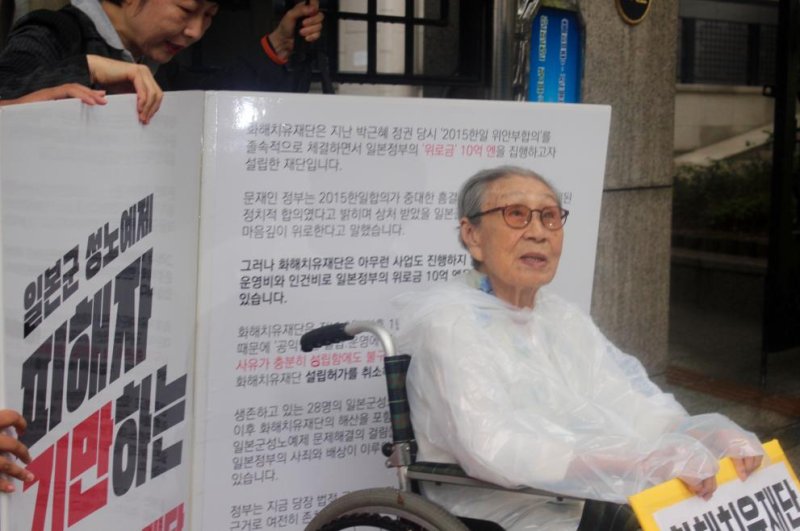Former "comfort woman" Kim Bok-dong holds a one-woman rally in August in Seoul. The Reconciliation and Healing Foundation was created in 2015 to provide nearly $10 million in funds as reparations to surviving comfort women. File Photo by Elizabeth Shim/UPI
Oct. 25 (UPI) -- South Korean and Japanese diplomats are discussing a 2015 agreement that culminated in the foundation of a fund to assist former "comfort women."
The deal to provide financial reparations through the Reconciliation and Healing Foundation has been met with protests among victims of Japanese wartime sex slavery, an issue that was addressed in talks on Thursday in Tokyo, Yonhap reported.
The South Korean foreign ministry confirmed Deputy Foreign Minister Cho Hyun met with his Japanese counterpart Takeo Akiba to discuss the foundation and other issues affecting South Korea-Japan ties, according to the report.
The foundation was created after former South Korean President Park Geun-hye and Japanese Prime Minister Shinzo Abe co-signed an accord to provide nearly $10 million in funds as reparations to surviving comfort women.
Not all survivors agreed to accept Japanese compensation, because the money came from private contributions.
The foundation retains about $5.1 million of undistributed funds, and the two sides have disagreed about the ultimate fate of the organization. South Korean President Moon Jae-in wants the funds returned and the deal canceled but Abe has refused to reverse the agreement.
According to Kyodo News, on Thursday Akiba requested the "steadfast implementation" of the 2015 agreement. Japan also refused to discuss lawsuits filed by Korean victims of forced labor during wartime.
This year the two countries mark the 20th anniversary of the Kim-Obuchi Declaration, signed by former President Kim Dae-jung and Prime Minister Keizo Obuchi. The two sides pledged to build a "future-oriented relationship based on reconciliation" in 1998.
Some Japanese opposition party politicians are calling for improved relations with South Korea.
In an interview with South Korean newspaper JoongAng Ilbo on Wednesday, Yuichiro Tamaki, a Japanese politician and leader of the Democratic Party for the People, said it is important to "build confidence" between the two countries and strengthen relations.
The two countries continue to dispute over issues of history and territory.















